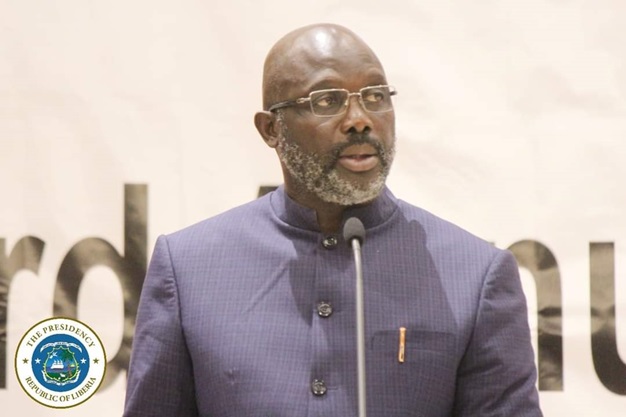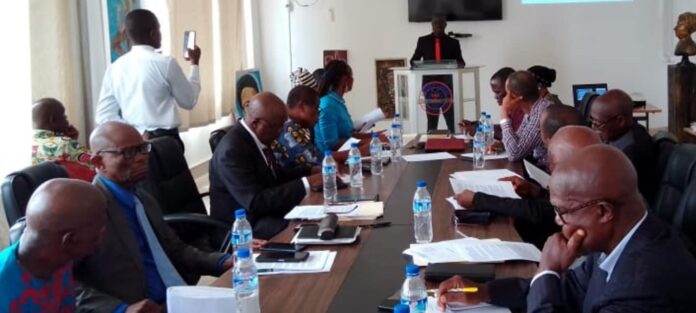A much-criticised census and a cash-strapped electoral commission are the biggest signs that the October elections could be bungled.
By Robtel Neajai Pailey and Oscar Bloh
Six months before high-stakes presidential and legislative elections scheduled on 10 October 2023, Liberia is engulfed in a cascading crisis that could implode if the National Elections Commission (NEC) does not arrest the slide of logistical errors and political miscalculations.
Liberia’s fourth post-war elections will be held two months after the country commemorates 20 years of ‘peace’ following a protracted civil war from 1989-2003. Managed single-handedly by Liberian officials for the first time since a 10,000-strong United Nations mission withdrew, these elections will be a litmus test for the country’s fragile peace and security.
The prospects are already worrying.
A splintered opposition, known locally as the Collaborating Political Parties, sued the NEC recently for breaching constitutional protocols by commencing voter registration without demarcating electoral constituencies as stipulated in a 2022 national population census whose provisional results were released earlier this year.
While the census has been lampooned – the southeastern region, from where the president hails, showed a dubious 87 percent increase in population in the 15 years since the last census – its final results due to be released in May should have served as the basis for clearly reapportioning constituencies and delineating electoral districts. A pending Supreme Court ruling on the NEC’s constitutional compliance, or lack thereof, represents one of the many controversies confounding the electoral body.
Populated by political appointees who appear to be loyal to embattled president George Oppong Weah, Liberia’s NEC has repeatedly demonstrated its inability to organise free and fair elections. For months, it was locked in a battle of wills with the government’s procurement regulator over the selection of a biometric voter registration (BVR) supplier. After finally contracting a company, months elapsed before the NEC received approval of any funding from the national legislature thus delaying procurement and delivery of the BVR system.
Liberia’s transition from manual to biometric voter registration is clearly a step in the right direction and, if administered properly, could improve the quality of elections. However, conducting registration six months before election day risks eroding citizens’ trust and undermining the credibility of polling outcomes.
Technical glitches, biometric card shortages and general ineptitude by NEC employees marred the first phase of voter registration which ended on 9 April, dampening hopes for any improvement in subsequent phases involving hard-to-reach political sub-divisions if current challenges are not addressed.
The NEC’s missteps bear repeating here.
Temporary staff hired by the NEC to supervise voter registration did not conduct due diligence in demanding proof of age and citizenship such as passports, national IDs, previous voter cards or testimonies from community members. This means anyone, and we mean anyone, who appears at a centre to register can be issued a BVR card, which has negative implications for the authenticity and reliability of the voter roll. Similarly, individuals who upload their bio details via a personal data portal in advance of arrival at registration centres are not asked to show proof of age and citizenship, thus ruling out further scrutiny of identity.
To add insult to injury, NEC contractors have been instructed to only verify citizenship eligibility if they suspect someone is not Liberian, based on a person’s last name, ‘accent’ and phenotype. This faulty safeguard is prone to abuse since ethnic minorities, mixed-raced nationals and transnational dual citizens may be disenfranchised.
Similarly, widespread ‘trucking’ or movement of citizens, directly linked to vote buying, has elicited little or no intervention from government authorities. While a few NEC contractors have been dismissed for unethical or unprofessional conduct, these administrative actions are not backed by punitive measures such as prosecution to serve as a deterrent.
Despite the litany of complaints against the NEC, Liberia’s national legislature is partly to blame for the growing pile of logistical errors: it approved only a third of the requested budget for the elections thus considerably constraining the electoral body’s capacity. Questions remain about whether sufficient resources, financial and otherwise, will even be available for the actual conduct of elections in October, as a tug-of-war persists between the legislature and the executive.
Political elites have not exactly helped matters.
Although the heads of Liberia’s major parties recently signed a pact, known as the ‘Farmington River Declaration 2023’, to avert any violence that would undermine elections, this performative act of solidarity comes too little too late. Two examples stand out. In one electoral district, voter trucking by political entrepreneurs incited hostility and disrupted the registration process. Similarly, members of the legislature intimidated NEC staff accused of registering foreigners in one political sub-division where a town chief was severely flogged.
While campaign-era physical violence has been sporadic, the electoral irregularities we have observed represent a glaring indication of what Johan Galtung, considered the ‘father’ of peace and conflict studies, called ‘structural violence’. Rules, regulations, norms and beliefs that foment inequality and injustice are imperilling Liberia’s electoral process.
In order to prevent a constitutional catastrophe, the Liberian government must disburse financial resources immediately to the NEC for the timely completion of electoral activities. The NEC must remain vigilant about constitutional mandates related to the rights of voters, political parties and independent candidates as a means of deterring legal challenges at the Supreme Court. State authorities must hold individuals and groups criminally liable for violating the law as a way of dealing with impunity. And last, but certainly not least, the NEC must in its second phase of BVR process apply eligibility criteria consistently across all registration centres.
If implemented promptly, these recommendations could halt what we fear may be a bungled election that triggers a much wider political crisis. Source: africanarguments.org







